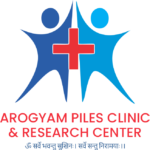Crohn’s disease is a chronic inflammatory bowel disease that affects the gastrointestinal tract, causing inflammation, ulcers, and various symptoms such as abdominal pain, diarrhea, and fatigue. One common and concerning symptom of Crohn’s disease is the presence of blood in the stool, which can indicate inflammation or damage to the digestive tract. While conventional medicine offers several treatment options, Ayurveda, the ancient Indian system of medicine, provides holistic approaches to manage and alleviate the symptoms of Crohn’s disease. In this blog, we will explore Ayurvedic insights from Arogyam Piles Clinic and Research Center in Mohali, Chandigarh, focusing on the Ayurvedic management of Crohn’s disease, particularly addressing the cause of blood in the stool.
Understanding Crohn’s Disease:
Crohn’s disease is believed to be caused by a complex interplay of genetic, environmental, and immune factors. In Ayurveda, Crohn’s disease is classified under the category of “Grahani,” which is related to the digestive fire (agni) and the small intestine. According to Ayurvedic principles, an imbalance in the digestive fire leads to the accumulation of toxins (ama) in the gut, resulting in inflammation, ulcers, and bleeding.
Ayurvedic Approach to Crohn’s Disease:
Arogyam Piles Clinic and Research Center, renowned for its expertise in Ayurvedic treatments, provides comprehensive management strategies for Crohn’s disease. Their approach focuses on rebalancing the digestive fire, removing toxins, and providing nourishment to the gastrointestinal system. Here are some key insights from their Ayurvedic management protocol:
- Herbal Medications: Arogyam Piles Clinic utilizes a combination of Ayurvedic herbs and formulations to address the underlying causes of Crohn’s disease. These herbs possess anti-inflammatory, antimicrobial, and immunomodulatory properties, which help reduce inflammation in the gut and promote healing. Some commonly used herbs include Kutaj (Holarrhena antidysenterica), Bilva (Aegle marmelos), and Haritaki (Terminalia chebula).
- Dietary Recommendations: Proper diet plays a crucial role in managing Crohn’s disease. Arogyam Piles Clinic emphasizes the consumption of easily digestible, warm, and freshly prepared meals. They recommend incorporating foods that are soothing to the gut, such as cooked vegetables, soups, rice, and easily digestible grains. Avoiding spicy, fried, and processed foods, as well as allergenic substances, is also advised.
- Panchakarma Therapies: Panchakarma, a set of Ayurvedic detoxification and rejuvenation therapies, is employed to eliminate toxins and restore balance in the body. Arogyam Piles Clinic offers specific Panchakarma treatments, such as Virechana (therapeutic purgation) and Basti (medicated enema), which help cleanse the digestive tract, reduce inflammation, and improve overall gut health.
- Stress Management: Stress is known to exacerbate the symptoms of Crohn’s disease. Arogyam Piles Clinic recognizes the importance of stress management techniques, such as meditation, yoga, and breathing exercises, in alleviating the symptoms and promoting overall well-being.
Conclusion:
Crohn’s disease can significantly impact the quality of life for those affected. While conventional medicine provides various treatment options, Ayurveda offers a holistic approach to manage the symptoms and address the underlying causes of the disease. Arogyam Piles Clinic and Research Center in Mohali, Chandigarh, specializes in Ayurvedic management of Crohn’s disease, focusing on rebalancing the digestive fire, detoxification, and dietary modifications. By incorporating herbal medications, Panchakarma therapies, and stress management techniques, individuals with Crohn’s disease can find relief and improve their overall health. It is important to consult with qualified Ayurvedic practitioners to receive personalized treatment plans tailored to individual needs.



